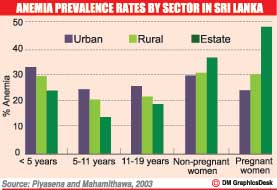Reply To:
Name - Reply Comment
Last Updated : 2024-04-24 16:34:00
_DM-recast--9(1).jpg) Pushparani was only 14 years old when she gave up school and started working as a tea-plucker. It was the sole option left in order for her to survive with her grandmother. Today, exactly 17 years later, this mother of five does not feel as if the wages, working conditions or the eternal struggle to put food on the table she experienced as a child, have changed for the better.
Pushparani was only 14 years old when she gave up school and started working as a tea-plucker. It was the sole option left in order for her to survive with her grandmother. Today, exactly 17 years later, this mother of five does not feel as if the wages, working conditions or the eternal struggle to put food on the table she experienced as a child, have changed for the better. Her eldest is 14 years old and the youngest is not even one-year-old. Pushparani points out more than half their daily earnings is spent on purchasing milk powder for the kids. “A packet of milk powder costs Rs. 325 and it lasts only for a maximum of three days. My two eldest children are attending school, so the necessary expenses for transportation and stationery always exceed Rs. 5000 per month. On days when my husband or I are unable to find work, we can barely provide the three meals for the children.”
Her eldest is 14 years old and the youngest is not even one-year-old. Pushparani points out more than half their daily earnings is spent on purchasing milk powder for the kids. “A packet of milk powder costs Rs. 325 and it lasts only for a maximum of three days. My two eldest children are attending school, so the necessary expenses for transportation and stationery always exceed Rs. 5000 per month. On days when my husband or I are unable to find work, we can barely provide the three meals for the children.”.jpg) Raja Premadasa, director of the plantation development and monitoring division of the Ministry of Plantation Industries said that similar to other government sector workers the estate worker receives an average payment of Rs 12,000- Rs 15,000.
Raja Premadasa, director of the plantation development and monitoring division of the Ministry of Plantation Industries said that similar to other government sector workers the estate worker receives an average payment of Rs 12,000- Rs 15,000. awareness programmes to educate them about managing finances but most of the males spend their wages on alcohol consumption” he said. He said that the ministry has initiated programmes for pregnant mothers and children up to two years of age in order to increase their nutrition levels. He pointed out that unlike other workers in the rural areas the estate workers get some of the facilities like housing and education free of charge. “If you consider even in the urban society finding accommodation is very difficult but they have housing facilities for free. We have renovated 30,000 line rooms so far and have constructed rest rooms in their working fields with water and sanitation facilities” he noted. Speaking further he said more than poor wages the estate workers find it hard to manage their expenses mainly due to the alcohol consumption.
awareness programmes to educate them about managing finances but most of the males spend their wages on alcohol consumption” he said. He said that the ministry has initiated programmes for pregnant mothers and children up to two years of age in order to increase their nutrition levels. He pointed out that unlike other workers in the rural areas the estate workers get some of the facilities like housing and education free of charge. “If you consider even in the urban society finding accommodation is very difficult but they have housing facilities for free. We have renovated 30,000 line rooms so far and have constructed rest rooms in their working fields with water and sanitation facilities” he noted. Speaking further he said more than poor wages the estate workers find it hard to manage their expenses mainly due to the alcohol consumption..jpg) Due to extreme poverty most of the estate workers cannot afford a nutritious meal and therefore their health levels are poor, claimed chairman of the All Ceylon Estate Workers’ Union, Ramalingam Chandrasekaran.
Due to extreme poverty most of the estate workers cannot afford a nutritious meal and therefore their health levels are poor, claimed chairman of the All Ceylon Estate Workers’ Union, Ramalingam Chandrasekaran.
.jpg) |
|
Ramalingam Chandrasekaran |
 “I have lived in this estate since my birth. In my opinion, the most unfortunate situation of all that befell this estate is the closure of the estate hospital. It was constructed over 100 years ago, during the British rule. But since 2002, the hospital has been closed and even to obtain treatment for a wound we have to travel to the nearest hospital, which is in Kahawatte. The transportation cost amounts to around Rs. 600 and how can these people afford such an amount to travel to the hospital?” he questions.
“I have lived in this estate since my birth. In my opinion, the most unfortunate situation of all that befell this estate is the closure of the estate hospital. It was constructed over 100 years ago, during the British rule. But since 2002, the hospital has been closed and even to obtain treatment for a wound we have to travel to the nearest hospital, which is in Kahawatte. The transportation cost amounts to around Rs. 600 and how can these people afford such an amount to travel to the hospital?” he questions..jpg) Unlike Punyamoorthi, his neighbour Arunashanthi met with accident while she was working the nightshift in the tea factory. “I am usually put on duty on the tea-leaf crushing machine. That day I slipped and fell but I didn’t make it a point to notify my accident because I did not think it would worsen,” she says, pointing at the crutches that rested near her the chair she was seated.
Unlike Punyamoorthi, his neighbour Arunashanthi met with accident while she was working the nightshift in the tea factory. “I am usually put on duty on the tea-leaf crushing machine. That day I slipped and fell but I didn’t make it a point to notify my accident because I did not think it would worsen,” she says, pointing at the crutches that rested near her the chair she was seated..jpg) Due to low wages, Pushparani is compelled to work during both day and night. “I work as a tea plucker for private plantations during the day and in the night I work at the tea-factory. But on days when the yield is low, we don’t get any work in the factory. . .” She admits her hectic work schedule has affected the education of her children, imposing difficulties for her eldest child to attend school. “My three youngest children do not attend school so they have to be under someone’s care when I go to work during the day. Most of the families in the estates are not able to leave their children in the daycare centre because it is located about a mile away from our homes. So I am left with no choice but to keep the younger children under the care of my eldest until I return home,” Pushparani confesses.
Due to low wages, Pushparani is compelled to work during both day and night. “I work as a tea plucker for private plantations during the day and in the night I work at the tea-factory. But on days when the yield is low, we don’t get any work in the factory. . .” She admits her hectic work schedule has affected the education of her children, imposing difficulties for her eldest child to attend school. “My three youngest children do not attend school so they have to be under someone’s care when I go to work during the day. Most of the families in the estates are not able to leave their children in the daycare centre because it is located about a mile away from our homes. So I am left with no choice but to keep the younger children under the care of my eldest until I return home,” Pushparani confesses..jpg) J.M.A Premaratne, secretary of All Ceylon Estate Workers’ Union stated that the estate workers are deprived of the benefits the other employees are entitled to mainly because of the daily wage system.
J.M.A Premaratne, secretary of All Ceylon Estate Workers’ Union stated that the estate workers are deprived of the benefits the other employees are entitled to mainly because of the daily wage system..jpg) He said that the current plantation managers are obsessed with profit generation; as a result of that the management of the plantations’ conditions such as the soil quality and yields are neglected. Hence, an estate worker has to somehow produce the set amount of tea leaves to be entitled to his full wage even if the soil is not rich enough to generate high yields.”
He said that the current plantation managers are obsessed with profit generation; as a result of that the management of the plantations’ conditions such as the soil quality and yields are neglected. Hence, an estate worker has to somehow produce the set amount of tea leaves to be entitled to his full wage even if the soil is not rich enough to generate high yields.”.jpg) He said the uncertainty of their wage rates is the main problem faced by the estate workers and charged that the collective agreement between the plantation owners and a handful of unions get to decide the conditions of these payments. “There are over 70 estate sector trade unions. But only 12 are signing the collective agreement which decides the wage rates of the state workers. This is the cause for many of the wage anomalies in the estate sector as the plantation owners attempt to scrap the benefits of the estate worker to maintain their high profits” he said.
He said the uncertainty of their wage rates is the main problem faced by the estate workers and charged that the collective agreement between the plantation owners and a handful of unions get to decide the conditions of these payments. “There are over 70 estate sector trade unions. But only 12 are signing the collective agreement which decides the wage rates of the state workers. This is the cause for many of the wage anomalies in the estate sector as the plantation owners attempt to scrap the benefits of the estate worker to maintain their high profits” he said.mohamed asfar Thursday, 01 November 2012 10:41 AM
why in the earth she has five children when she knows it is impossible to feed them with their salaries ? is it hard to use some pills and prevent unnecessary pregnancy ? also note that their salaries with bonuses and other benefits comes to a fortune. ask any accountants who do accounts for tea estates.
abcd Thursday, 01 November 2012 05:50 PM
adcd
Praveen Friday, 02 November 2012 12:00 AM
This is still poit country. You can not expect the government to do everythibg for you via DM Android App

Add comment
Comments will be edited (grammar, spelling and slang) and authorized at the discretion of Daily Mirror online. The website also has the right not to publish selected comments.
Reply To:
Name - Reply Comment
US authorities are currently reviewing the manifest of every cargo aboard MV
On March 26, a couple arriving from Thailand was arrested with 88 live animal
According to villagers from Naula-Moragolla out of 105 families 80 can afford
Is the situation in Sri Lanka so grim that locals harbour hope that they coul